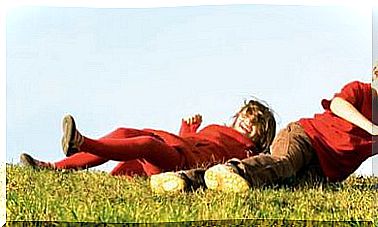“The Origin Of What We Feel Is What We Think”
Each person who reads this interview will have different thoughts, feelings and emotions. Because each brain has had different experiences and has different goals. Being aware of this, according to David del Rosario, can change the way you see life.

The neuroscience researcher and popularizer David of the Rosary is curious by nature. It was the need to put his own ideas in order while conducting research that led him to write The Book Your Brain Doesn’t Want to Read (Uranus), a work in which you won’t find the secret to being happy, but you will find the keys to being aware of the origin of your suffering.
– The first question is obvious: why is that the book that the brain does not want to read?
–The title refers to a universal property of all brains. In fact, I was able to experience it myself after reading a scientific article that, if what it explained were true, would assume that I had been wrong all my life.
I read it once, I read it again, I read it again, but I had a hard time remembering it. It was like my brain didn’t want to do it. Here comes the universal property that gives the book its name: the brain does not care about the truth, it cares about coherence. And try to keep it at all costs. As that article dismantled my world, my brain activated a defense mechanism, oblivion, to erase it from my mind so that my world would remain coherent.
This book is about that, of realizing, of becoming aware of things. Really, this does not change anything in your life, what changes is the way you see your life. There you discover that living is not the same as living life being aware of how your mind and your body work.
–You say in the book that most of the thoughts and memories we have are false. So why does it make us free to know how the organism works? Wouldn’t it make us more indecisive?
–A thought is a proposal, a neural imagination, and a memory is a thought that points to the past. The brain, despite what many people think, is not reactive. That is, we are not in a situation, someone tells us something and we react to that. The brain is predictive. That is, someone tells us something and the brain gives meaning to what they are trying to say. And how do you eat that?
Suppose the universe was extremely complex and you could only grasp a small part of that world with a human brain. Since he cannot assimilate such a complex world, what does he do? Imagine it. The human brain is a very imaginative organ and we have a lot of predictive brain mechanisms for it.
You don’t see the world: your brain imagines the world and compares it with what the senses tell it.
Our neurons build an imagination of the world as best they can. This is what is known as “predictive brain”, a model widely accepted by current neuroscience.
“So how does your imagination differ from mine?”
–Your imaginations and mine are built with different raw materials. The main difference between your imagination and mine is that our past experiences and future expectations are different.
–And what happens when we share a way of thinking, feeling or seeing the world?
–To propose a thought, the brain uses a neural network that is mainly in the left hemisphere and we know as “interpreter module”. In every life situation, the interpreter proposes a neural imagination, a thought. And how do you cook the thoughts? With three ingredients: past experience, future expectations and genetic base. My genetics, yours and any reader’s, are 99.9% identical.
These small differences in genes can be decisive in a pathology, but they do not seem to be so important in the genesis of thought.
When apparently two people share a way of thinking, they usually come from a similar cultural context, a context where they have been able to accumulate similar experiences and have similar goals. They also use similar thoughts all the time. Hence they seem to imagine the world in a similar way. And I say “it seems” because when you look at two brains from afar they are very similar, but as you look at them closer and closer, you discover that each brain is unique and each reality is unique.
–And that means…
–Well, all the people who may be reading this interview –where the information is exactly the same–, even if they live in the same building and have gone to the same school, will have different thoughts, feelings and emotions. Why? Because your brain has lived the same experiences in different ways and has different goals. Therefore, what each reader feels and thinks when reading this article does not come exclusively from the article but rather from their past experience and their future goals. And that is something that we do not know how to apply in our day to day.
– Why do we not know how to apply it in our day to day?
– Suffering, in healthy people with their basic needs covered, appears when our way of behaving is not aligned with the way our mind and organism function. When I begin to become aware that what I think is a neural proposal, an imagination and not a fact, I enter a space of ignorance.
Why can’t I put on the table that maybe the world is not how my brain sees it?
Within that space of ignorance, a lot of possibilities open up, such as, for example, stopping defending our ideas.
–But people are very offended…
–Yes, because they define themselves through their imaginations, through the proposals of their interpreter. They think that they are the ones who think them. And therefore, if those proposals are wrong, they are wrong. And that offends a lot.
–You have just named the suffering, and in the book you comment that you have to include situations that generate pain, anguish, sadness, fear … in a happy mental image. Isn’t that living deceived?
-It is not about turning something painful into something happy by being optimistic or putting a good day to bad every day. That is a form of self-deception. The proposal is to discover that your resistance to including a painful life situation as a possible happy life situation is the origin of your suffering. The proposal is to look at the origin of your suffering. There you discover that the suffering is not generated by the situation itself, but by your indisposition and the fear of living it.
Something very similar happens with emotions. Emotions do not make you sick, it is your unwillingness to feel an emotion that can make you sick. It is a subtle point that we do not see. At no point am I talking about positive thinking. Positive thinking doesn’t work.
-Why?
-Because it is not aligned with the way the mind and the organism work. We have seen that you do not think, your brain thinks, and it does so as naturally as your heart pumps blood or lungs air. So how are you going to make your thoughts more positive?
Positive thinking does not work because it is not aligned with how we function. We live happiness as an addiction to positive feelings.
Leave your brain alone and allow it to do its job. We have to start taking care of our indisposition. The question is: how willing am I to live the things that happen to me? Recognizing my indisposition as the source of my suffering is very beautiful, and it offers us a new vision about happiness.
–However, today we live surrounded by messages that push us to seek happiness, doesn’t that cause frustration?
-Totally. In my case, while I finished writing the last chapter in which I talk about happiness, my only objective was that whoever read the book (if anyone did) would stop looking for it, stop trying to change what they think or feel.
Feeling what you feel can never be wrong. We live happiness as an addiction to positive feelings because we live hooked on a happy mental image of happiness.
– What is the difference between positive thinking and happy mental image?
–People have a happy or ideal mental image of everything. For example, the happy mental image of a family is made up of a father, a mother, and perhaps two children. The couple”. But don’t let the parents get divorced! Divorce is not in the happy family image. If something happens, we will resist including divorce in my happy family image.
Resistance leads me to suffer. The more different my happy mental image is from my present situation, the more I will suffer. That’s the idea.
– And what is happiness for you?
–It is a mental construction without more. It is the result of the comparison between my happy image and my present moment. Happiness, as we see it today, is inherited from our predictive brain. We know someone, we like them and our brain imagines an outcome: “with this I’m getting married, I’m already 35 and my rice runs out.” I just built my happy image without realizing it. From then on, my brain will compare reality with my happy image all the time.
–So, setting goals and dreams (which are still predictions because we don’t know if we will achieve them) … does it lead us to unhappiness?
– There is nothing wrong with a prediction. Upside down. Remember that we cannot live the world as it is because we have a human brain and we cannot handle all the existing information. Living through predictions, images and simulations is a very efficient energy mechanism. The bad thing, if there is something “good” or “bad”, would be to live life without knowing that what we are seeing is not a fact, but an imagination, a prediction.
– You will understand that being aware that everything is an imagination creates insecurity, right?
-That’s how it is. But with what we have learned in this interview, we can begin to realize that those thoughts of insecurity are also an imagination, a proposal that we can begin to not use.
– What is the key to making decisions, knowing that nothing is real, but that it is only mental images? For example, imagine that I want to quit work because it no longer makes me happy.
-Let’s go in parts. First, that you are no longer happy is a proposal from your brain. It is not a fact, it is just a thought that is not part of your happy work image. When you begin to pay attention to that thought, you begin to discover that that thought generates a sensation in you. There you begin to see that the real connection is between what you think and what you feel, not between the situation – work – and what you feel.
Each person experiences reality in a different way, and if you analyze it, if you turn that into a scientific experiment, you realize that each person’s brain thinks differently.
Therefore, you are responsible for what you feel, not the situation. And how does that apply to day to day? Very easy. What you feel is talking about the usefulness of what your brain thinks. In this specific example that you have given, when your brain thinks that you are not happy at work and you start to feel that anguish, that anguish is speaking to you about the usefulness that that thought has for you at that moment. And what can you do? Decide whether to use it or not.
“What if I don’t use it?”
–You cannot know in advance what is going to happen, but you can know if that thought is useful or not. It’s about assuming how you work and putting it into practice. Notice, with this question that, at first it seemed that it pointed towards the situation – work -, suddenly it points towards you, and it leads you to see your thought for what it is: a proposal. That proposal is the father of what you feel.
When you realize that this thought is not useful, you stop using it, you stop paying attention to it.
Each time you do not use a thought, each time you do not pay sustained attention to a useless proposal, the probability that your brain will propose that thought again in a similar life situation decreases. That for me is re-educating the brain. That for me is bringing neuroscience to people’s day-to-day lives. Think what you think, feel what you feel, but become aware of where the origin of what is happening is. Not to change it, to feel better or be happier, but to explore it.
–You speak of the usefulness of thoughts. How can we know if they are useful or not?
– It is something very personal. Even a thought in one life situation can be helpful and not in another. In general, the answer to whether a thought is useful is not a rational argument. Is a feeling.
Our emotions and sensations are there for us to feel, not for us to educate or manage.
That is why it is important not to manage emotions. When we try to manage them, with the best of intentions, we lose the thread. We do not realize that the origin of what we feel is what we think, and we do not realize that the sensation is telling us about the usefulness of what we think.
– It seems that the origin of all emotion is thought, in no case is it the other way around?
– 85% of the time it is like this. Although sometimes you can also feel an emotion and, when you go to look where it comes from, you may not find the thought. That would be a tangled emotion. Even so, the important thing to live a life more fully is to stop paying attention, to use, those thoughts that are not useful.
This way of seeing the mind and the organism leads you to review everything that you had taken for granted in your day to day life. You can always re-experience it from this space more honest and more coherent with the shape of our mind and organism.
–To finish, what would you say to whoever is reading this right now?
– I would tell him: “do not use this interview to create a mental image that prevents you from fully living your next life situation.” That is what we have done so far; devise strategies to avoid feeling what you are feeling or thinking what you are thinking.
Let your brain think. Sit down. Discover yourself. Don’t believe anything about this interview. Use it to discover how you work, how your thought system works. Find out if this interview is useful to you in the way we have seen previously. If it isn’t, please don’t use it. Throw it away! But if it is useful for you right now, use it! put it into practice. We are not talking about whether it is true or a lie. It does not matter. It matters what awakens in you. Everything can change. Neuroscience can change. Things can change, your partner, your job … but what will never change is the possibility of feeling you now.
If you were interested in the interview …
- You can buy here The book that your brain does not want to read (Uranus).









